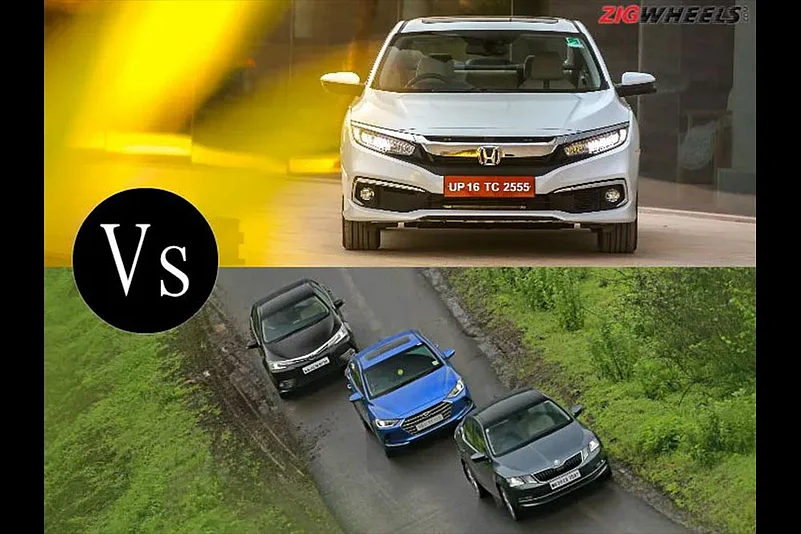The Honda Civic will make a comeback in the Indian market after a five-year hiatus. Does it have what it takes to take a very competitive segment by storm? The Civic will be back fighting against familiar names like the Toyota Corolla Altis, the Skoda Octavia and the Hyundai Elantra. Here’s how they compare, on paper.
Price

*all prices ex-showroom Delhi
The Honda Civic is expected to be priced at a premium in the segment, considering it's being assembled here from CKD kits rather than being manufactured here from the ground up. Will it be able to justify its price? Let’s take a look at what it has to offer.
Features
Honda Civic:

Hits - 7-inch colour MID, remote engine start (for cooling the car down on a hot day, presumably), lane-watch camera, multi-angle rearview camera.
Segment standards - 8-way electrically adjustable driver seat, dual-zone automatic climate control, sunroof, six airbags, 7-inch touchscreen infotainment system.
Skoda Octavia:

Hits - digital instrument cluster, eight airbags, traction control, tyre pressure monitoring system, front and rear parking sensors, panoramic sunroof, 12-way electrically adjustable driver and passenger seats, 10-speaker surround sound system.
Segment standards - 8-inch touchscreen infotainment system, dual-zone climate control.
Hyundai Elantra:

Hits - wireless phone charging, traction control.
Segment standards - Six airbags, 10-way electrically adjustable driver seat, dual-zone climate control.
Toyota Corolla Altis:

Hits - Paddle shifters, vehicle stability control.
Segment standards - seven airbags, 10-way electrically adjustable driver seat, rear parking sensors and rear camera, fully automatic air conditioning and six speakers.
On the face of it, the Civic does not seem to have a huge advantage over the competition in terms of features on offer. Maybe the quality would be enough to justify the expected premium pricing, but, we will have to wait and see.
Dimensions

The Skoda Octavia has the biggest exterior dimensions of all the cars here - be it in terms of overall length, width or height. It also has the biggest boot in this comparison.
But the Civic, along with the Elantra and the Altis, has a slightly longer wheelbase. Considering how adept Honda has been in the past, packaging its cars to make the most of the space available, we can expect the Civic to be spacious on the inside for four to five occupants.

If it wants to impress the rear-seat passengers, it will have tough competition from the Corolla Altis which won the rear seat battle in our real-world comparison test.
Diesel Powertrain

Yes, the all-new Honda Civic will be offered with a diesel engine, even though the demand for diesel-powered cars is expected to drop significantly in 2020.

While the on-paper performance figures are respectable (the Skoda Octavia takes the crown here), it is the claimed fuel-efficiency figure which has us rubbing our eyes. The claimed efficiency number of the Civic is almost 20 per cent more than the second most efficient car here (which is the Elantra, BTW).
Honda may face some flak from buyers for not offering an automatic transmission with what, on paper at least, seems to be a very efficient motor.
Petrol Powertrain

It is a similar story if you compare the petrol-powered variants of the cars here. The Civic is not too hot in terms of performance - in fact, it is just 1PS/1Nm short of being the least powerful/torquey car here!

Honda has done just the opposite for the petrol variant(s), pairing it exclusively with a CVT automatic unit. This variant is more efficient than other automatic petrol cars in the segment, but it looks like a manual variant may have been even more efficient than the segment leader, Skoda Octavia.
Which of these cars would you choose if you were in the market for a sub-Rs 30 lakh sedan? Let us know in the comments below.
Source: zigwheels.com


























